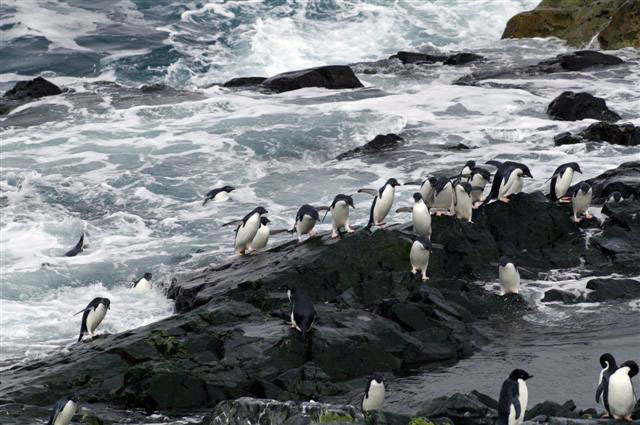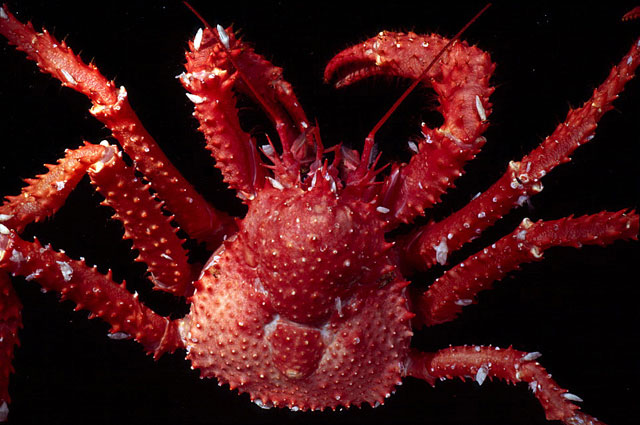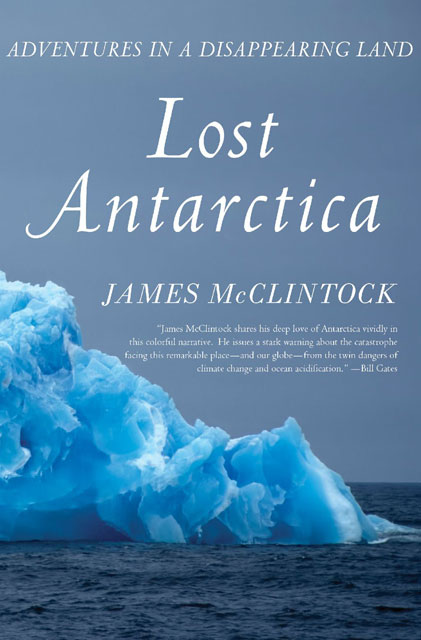|
Page 2/2 - Posted November 16, 2012
Lost Antarctica documents ocean acidification, invasive species4. Another chapter is devoted to what you call “The March of the King Crabs,” referring to an invasion of this species onto the continental slope of Antarctica, where organisms have evolved over millions of years without such predators. You have been involved in some research on this topic, and recently received a new grant from the National Science Foundation to examine this phenomenon in more detail. Your proposal says the invasion “could result in a wholesale restructuring of the Antarctic benthic ecosystem.” Would you talk a little bit about this upcoming project? Our NSF-funded research program (Rich Aronson In 2010, our first cruise discovered that king crabs were indeed present on the slope and we estimated a population of over half a million crabs in the region of Marguerite Bay. Most of the crabs were at the base of the slope but we did discover some that were within several hundred meters of the shelf break, an indication that with rising seawater temperatures the crabs may very well be poised to move up and on to the shelf. In our upcoming project we will greatly expand upon our initial cruise running transects across the shelf and down the slope in two additional regions of the bay. Each transect is conducted by a remote operated vehicle we lease from Woods Hole [Oceanographic Institution] that is towed behind the ship and equipped with high-quality image cameras that take a photo every few seconds and send it immediately to the ship at the surface for real-time analysis. We will couple the transect work in the upcoming cruise with an attempt to trap crabs and bring them to the surface so as to better evaluate their reproductive condition and feeding habits (gut contents). Our initial cruise study suggested they are reproductively active, and our upcoming cruise should provide sufficient data to make certain. We also want to know what the crabs are feeding upon in order to evaluate their potential to consume common Antarctic invertebrates. There is no reason to suspect that should the crabs move up on to the Antarctic shelf that they will not have a dramatic negative impact on populations of Antarctic marine invertebrates such as clams, snails and brittle stars. Accordingly, a unique and ancient seafloor ecosystem may suffer rapid and permanent ecological shifts. 5. Most scientists agree that climate change is occurring on a global scale, due largely to anthropogenically produced carbon dioxide and other greenhouse emissions. But what would do you see as the biggest uncertainty today in climate-change science, and how does Antarctica fit into the picture? Almost all climate scientists now agree that the Earth is warming and that humankind is by and large responsible for this through the burning of fossil fuels. The uncertainty that exists around this issue is primarily fabricated by those that are paid by the energy industry to plant doubt (the same companies that were paid by the cigarette industry to plant doubt about the danger of cigarettes) and thus slow the process of moving away from lucrative fossil fuels. The uncertainty that surrounds climate-change science is not whether it is occurring but just how bad it will get. So far, climate scientists appear to have underestimated the coming impacts and rates of climate-related events. For example, the arctic ice is melting much faster than early models predicted. As per Antarctica, until recently there was some uncertainty about whether West Antarctica was warming in concert with the Antarctic Peninsula. In a recent paper in Nature, scientists demonstrated through satellite and ground station data that indeed West Antarctica is warming, albeit at a much slower rate than the Peninsula. Fortunately, so far there is no evidence that East Antarctica is warming, probably because of current patterns of the Southern Ocean. 6. Despite what can be a depressing state of affairs based on the changes under way in Antarctica that you document in the book, the last chapter ends on a note of hope. You talk in great detail about the global action that took place after the discovery of the annual ozone hole over Antarctica. You obviously see Antarctica as a potential catalyst for worldwide action on climate change. Why do you think it hasn’t happened yet — and is it already too late for the world to take action given current climate projections? There is still time for Antarctica and its wildlife to serve as a catalyst of hope when it comes to bringing attention to the climate-change impacts occurring increasingly on our planet. In part, I see my book as one of the several ways to help make this happen. It is important that those [who] visit or work in Antarctica help share the story of Antarctic climate change and its impacts with friends and family and with their elected representatives. Remember that as a polar ecosystem, Antarctica is uniquely sensitive to climate change. It is the canary in the coalmine. It is a wake up call — and the phone is ringing. NSF-funded research in this article: Charles Amsler and James McClintock, University of Alabama at Birmingham, Award No. 0838773 |



For USAP Participants |
For The Public |
For Researchers and EducatorsContact UsNational Science FoundationOffice of Polar Programs Geosciences Directorate 2415 Eisenhower Avenue, Suite W7100 Alexandria, VA 22314 Sign up for the NSF Office of Polar Programs newsletter and events. Feedback Form |




